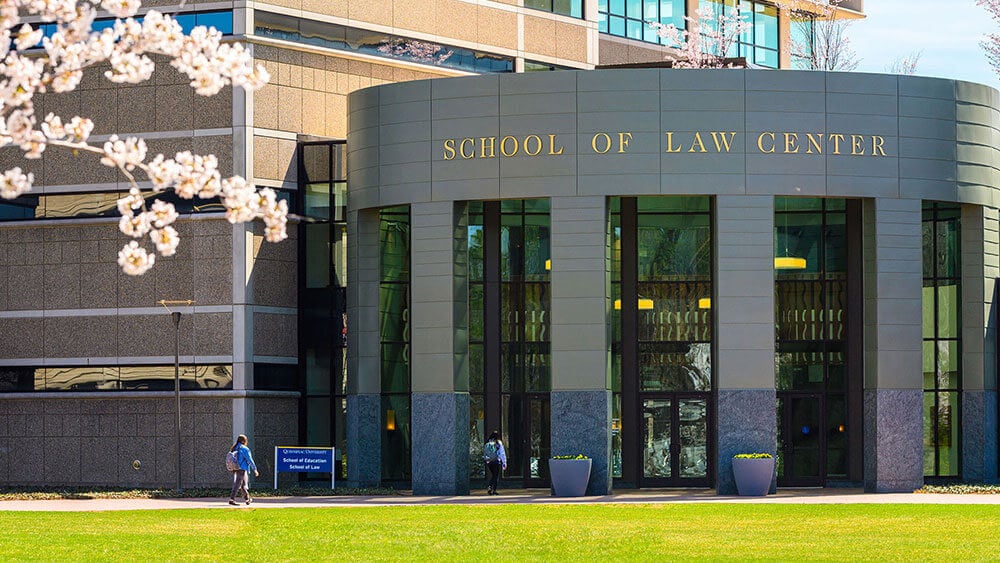
Quinnipiac Law participates in discussion with U.S. Attorney General on reducing homelessness
February 28, 2022

February 28, 2022

Representatives from Quinnipiac Law’s Homelessness Mitigation Mediation Project and their counterparts from other law schools attended the meeting. The discussion focused on the results of Merrick’s call for action to law schools to aid housing stability in their communities.
In response, the law schools committed to using their available resources to liaison with outside legal services providers and community outreach groups in order to promote housing stability, an arena particularly shaken by the COVID-19 pandemic.
The Department of Justice’s call came in August 2021, six months after Quinnipiac Law began work with the Connecticut Department of Housing and other contracted partners to keep people stably housed and help landlords stay afloat, said adjunct law professor, director of the Mediation Clinic and Homelessness Mitigation Mediation Project executive director Brendan Holt. The resulting mediation group is called UniteCT.
“We function as intermediatory for other services; we help have discussions with landlords and tenants, tenants and other service providers,” said Holt. “We try to assist holistically and long-term, past the acute need and what happens at the courtroom steps. We strive to help people find better language and repair other situations.”
UniteCT continually collects data from clients in order to discern how initial efforts are unfolding, he said.
Over the past two semesters, 11 Quinnipiac Law students assisted in the mediation clinic. Homelessness Mitigation Mediation Project inaugural fellow was Jamie SaintPaul, JD ’20. Diana Lamb, JD ’21, is the current fellow.
“I help people remotely every day and have had the opportunity to co-mediate tenant and landlord disputes in the hope of stabilizing housing in the state of Connecticut. I also help maintain files, records and data for the Homelessness Mitigation Mediation Project,” said Lamb. “I like to help people, and this has given me the opportunity to help many tenants and landlords during these difficult times.”
Lamb also participated in the mediation certificate program offered by Quinnipiac’s Center on Dispute Resolution (CDR). It continually benefits her current work with Homelessness Mitigation Mediation Project, she said.
Justin Court JD ’23, a fellow for the Center on Dispute Resolution, participated in the White House meeting.
“When I came to law school, I had no idea what mediation, or even alternative dispute resolution, was. Through my experience in the mediation clinic, as well as my CDR fellowship, I have been exposed to a realm of the law that I truly find to be intriguing,” said Court. “It was awesome seeing and hearing other individuals and institutions who have similar goals and programs that we have at Quinnipiac.”
Though born of the COVID-19 crisis, the important mission of UniteCT will hopefully continue for years to come.
“We are working on more functional programming to keep interacting. We will focus on different and better types of communication to better facilitate between legal, policy and social issues,” said Holt. “Best practices are developing across the country, around the confluence of services to work as a team and a multifaceted effort.”
This type of interdisciplinary endeavor is characteristic of Quinnipiac’s learning ecosystem, and collaboration with social work master’s students and other schools may be on the horizon, said School of Law Dean Jennifer Brown.
“Most fundamentally, we want the Quinnipiac law school to be a positive contributor to efforts that keep people in their homes, to prevent the disruption and public health crisis, education crisis and employment crisis that result from displacement from one’s home,” said Brown. “That’s what makes it exciting, that our law school can be part of something that has such a valuable outcome for this central goal.”
Quinnipiac Today is your source for what's happening throughout #BobcatNation. Sign up for our weekly email newsletter to be among the first to know about news, events and members of our Bobcat family who are making a positive difference in our world.
Sign Up Now